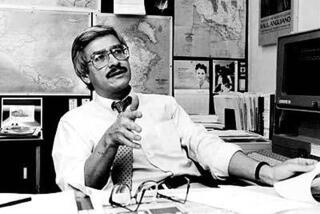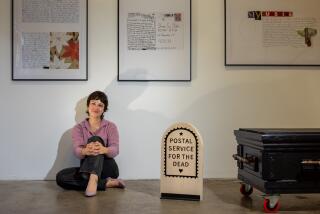A Lesson in Kindness Finds New Life on Internet
- Share via
MORRIS, Minn. — With a stroke on a keyboard, the electronic letter snaked through cyberspace, bouncing from one corner of the globe to another before reaching Sandy Kudenov’s computer.
It was a chain e-mail promising good fortune to recipients who passed it on--and Kudenov almost dismissed it as junk mail.
But it had come from a friend who encouraged her to read this tale about a nun, a soldier and a piece of paper.
So she did, and when finished she thought: Everybody should read this.
Hitting the send button in her Livermore, Calif., home, she forwarded it along and became one more link in the Internet chain of thousands--perhaps millions--sharing this recounting of a transforming act of kindness.
But even as she sent it she wondered: Is the story true?
The same question has been asked again and again in letters reaching this Minnesota farming town of 5,500 from across the United States and far away. From Bombay, India. From the USS Kitty Hawk in the Pacific.
Is it true?
The reply from Sister Helen Mrosla, the local Franciscan nun and teacher at the center of the chain-letter story: Yes, it is.
*
“After teaching for 35 years . . . I know that I’ll never have another Mark Eklund in any of my classes,” begins Sister Mrosla’s story, words she wrote a decade ago that someone unknown has since put on the Internet.
Mark was the kind of student teachers never forget--a precocious, polite kid who was always drawing attention without really trying.
Mark met Sister Mrosla (pronounced Mer-oh-sluh) in 1959 in her third-grade classroom at St. Mary’s School.
He tested her with his shenanigans. Once she sent him to the cloakroom for misbehaving and he climbed out the window of the two-story school, up the fire escape and onto the roof.
Then there was the chatter.
“Mark talked incessantly,” she wrote. “I had to remind him again and again of the classroom rule that talking without permission was not acceptable. What impressed me so much was his sincere response every time I had to correct him for misbehaving: ‘Thank you for correcting me, Sister.’
“One day my patience was growing quite thin when Mark talked once too often, and that was when I made the mistake most novice teachers make. . . . I looked at Mark and said, ‘Mark, if you say one more word, I am going to tape your mouth shut.’ It wasn’t 10 seconds later when Chuck [Lesmeister, a classmate] blurted out, ‘Mark is talking again.’ ”
She was forced to follow through on her threat.
“The only way I could make it stick was by putting the tape on so that it looked as if Mark had a big X over his mouth. . . . I picked up the reading book and glanced at Mark to see how he was doing. At that moment he winked at me. That did it. I melted and started laughing. The entire class cheered as I walked back to Mark’s desk, removed the tape and shrugged my shoulders.”
No matter the punishment, at the end of every day Mark stopped at the teacher’s desk. “Good night, Sister. Thank you for teaching me,” he would say.
Sister Mrosla moved to junior high, and she and Mark met again, in eighth-grade math class. “The same ol’ Mark,” she recalled fondly.
Assignment: Write Some Kind Words
One Friday after a tough week of algebra, she sensed that her students were struggling and feeling dejected.
Put the math books away, she told them, and pull out a sheet of paper. On every other line, she said, write the name of each student in class and next to the name write a kind word--a sincere compliment.
That weekend she compiled the lists for each student on yellow legal-size paper, adding her own compliment at the end.
She handed the papers back during the next class.
On Mark’s paper, among other simple compliments, somebody had written, “A great friend.” His best friend, Chuck Lesmeister, was “fun to be around.” On Judy Holmes Swanson’s list, someone noted that she “smiles all the time.”
“No one ever said anything about the exercise after that class period,” Sister Mrosla wrote in the letter on the Internet. “I never knew if they discussed it with one another after class or if they mentioned it to their parents. It didn’t matter. The exercise accomplished what I hoped it would--the students were happy with themselves and one another again.”
*
Years passed. The schoolchildren grew up. Life went on. Returning from a vacation in August 1971, Sister Mrosla was met by her parents at the Minneapolis-St. Paul airport. They were barely onto the highway when her father cleared his throat, “as he usually did before saying something important,” she wrote.
“Mark was killed in Vietnam,” he told her. “The funeral is tomorrow.”
He had died in his sleep of a pulmonary and cerebral edema. He was 20.
Four months earlier, Mark had been sent to Vietnam, assigned to the 585th Transportation Company in Phu Bai, delivering supplies to firebases.
His letters to family painted a safe picture, describing his work as a clerk at a truck-parts depot far from the shooting. But to friends, including Sister Mrosla, he revealed fears of dying and frustration over what he perceived as a fruitless war effort. He told his former teacher about lying in his bunk listening to a firefight one night.
“He was scared to death from the shooting,” Sister Mrosla said. “He’d have nightmares about it. I remember telling him I was praying for him.” She filled her letters with stories about her students and how much they were like his class.
Students Share Their Memories
Mourners at Mark’s funeral lined the block around the red-brick Assumption Church, second only to the town’s grain elevator in height. They filed up the stairs, into the sanctuary and past the open black casket. Sister Mrosla was the last in line.
“The only thing I could think of or wanted to say at that moment was, ‘Mark, I would give all of the masking tape in the world if only you would talk to me,’ ” she wrote.
Lesmeister helped bear the casket, draped in a flag, to a hearse for the five-block ride to the cemetery, where a soldier played “Taps.” As it was lowered into the ground, a soldier approached Sister Mrosla.
“Are you Mark’s math teacher?” he asked. “He talked about you. You may want to talk to his parents about his personal effects.”
The Eklunds were waiting for the nun when she arrived at a reception at the Lesmeister family farmhouse. Standing in the sunny kitchen, James Eklund pulled out a wallet.
“We want to show you something. They found this on Mark when he was killed. We thought you might recognize it,” he said, gently taking out a worn piece of paper that had been refolded many times and taped together.
“I knew without looking at the writing,” Sister Mrosla wrote, “that the papers were the ones I had listed all of the good things each of his classmates had said about Mark.”
A few of Mark’s school friends who were gathered around also recognized the paper, and one by one they told her they still had theirs.
Lesmeister preserved his in his wedding album. Marilyn Lohr kept hers in her diary. And, like Mark, Jim Halbe had his with him in his wallet.
“That’s when I finally sat down and cried . . .,” Sister Mrosla’s e-mailed letter continued. “He gave so much to all of us.”
*
Nearly a decade ago, Sister Mrosla wrote about Mark and the list of compliments for Proteus magazine, which had published a notice seeking stories about education. It was reprinted by Reader’s Digest.
But it wasn’t until her words were put on the Internet that they gained a global readership. Sister Mrosla is happy that people are reading the story, but unhappy that it has become a chain letter promising good luck to recipients who pass it on.
“It cheapens it somehow,” she said, sipping hot chocolate on a bitterly cold Minnesota day.
At 63, she still teaches. Now it’s college students who will one day be teachers themselves. She tells them about the compliment list and the reassurance it seemed to give to the once-impish pupil she’ll never forget.
As the chain letter circulates, letters and telephone calls continue to come in from folks wanting to know more. A pastor gave a sermon using the story as a lesson about kindness.
And three strangers have sent the nun rubbings of Mark’s name from the Vietnam Veterans Memorial wall in Washington, D.C.
” . . . As thousands and thousands visit the Vietnam memorial each year, I hope they will know that Mark Eklund is not just another name on the wall,” she wrote in the Internet letter.
And she concluded: “Good night, Mark. Thank you for letting me teach you.”
More to Read
Sign up for Essential California
The most important California stories and recommendations in your inbox every morning.
You may occasionally receive promotional content from the Los Angeles Times.












